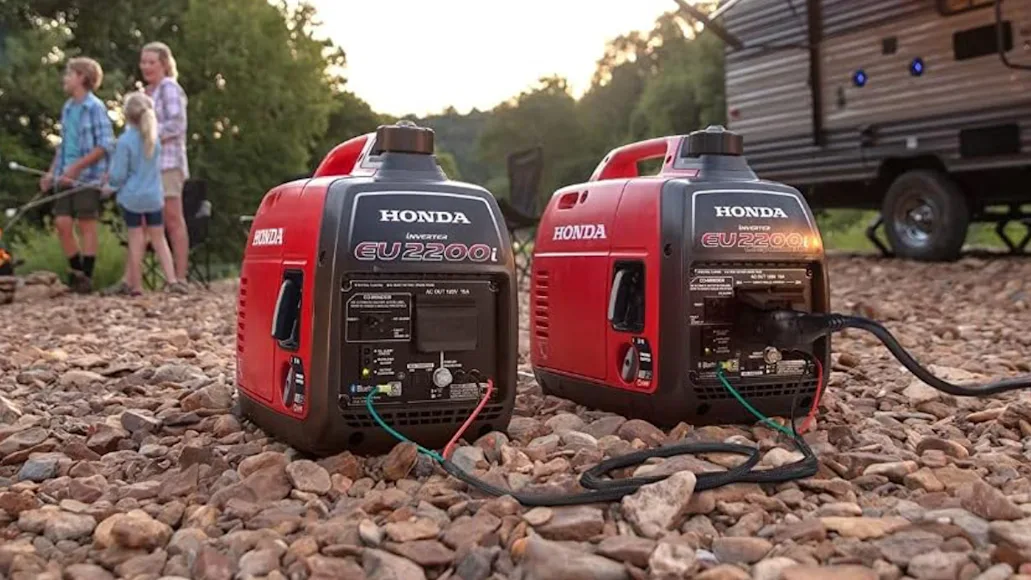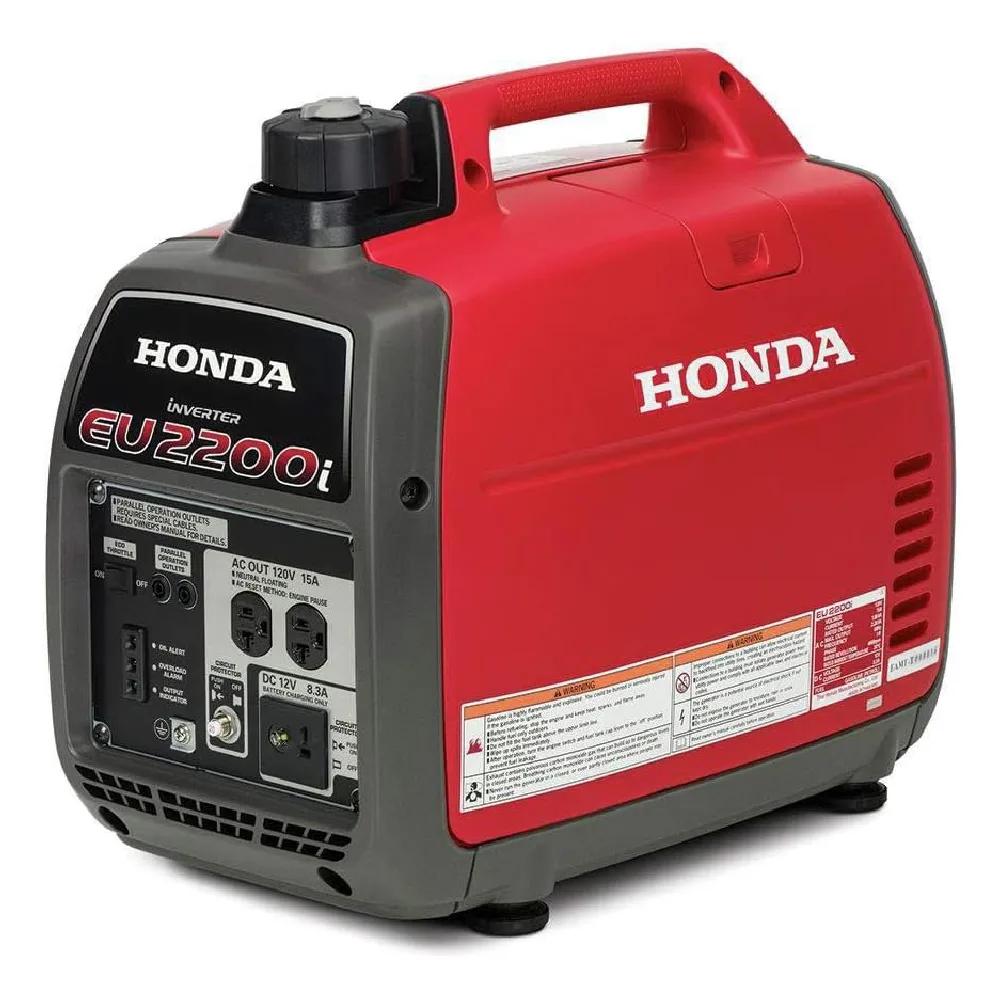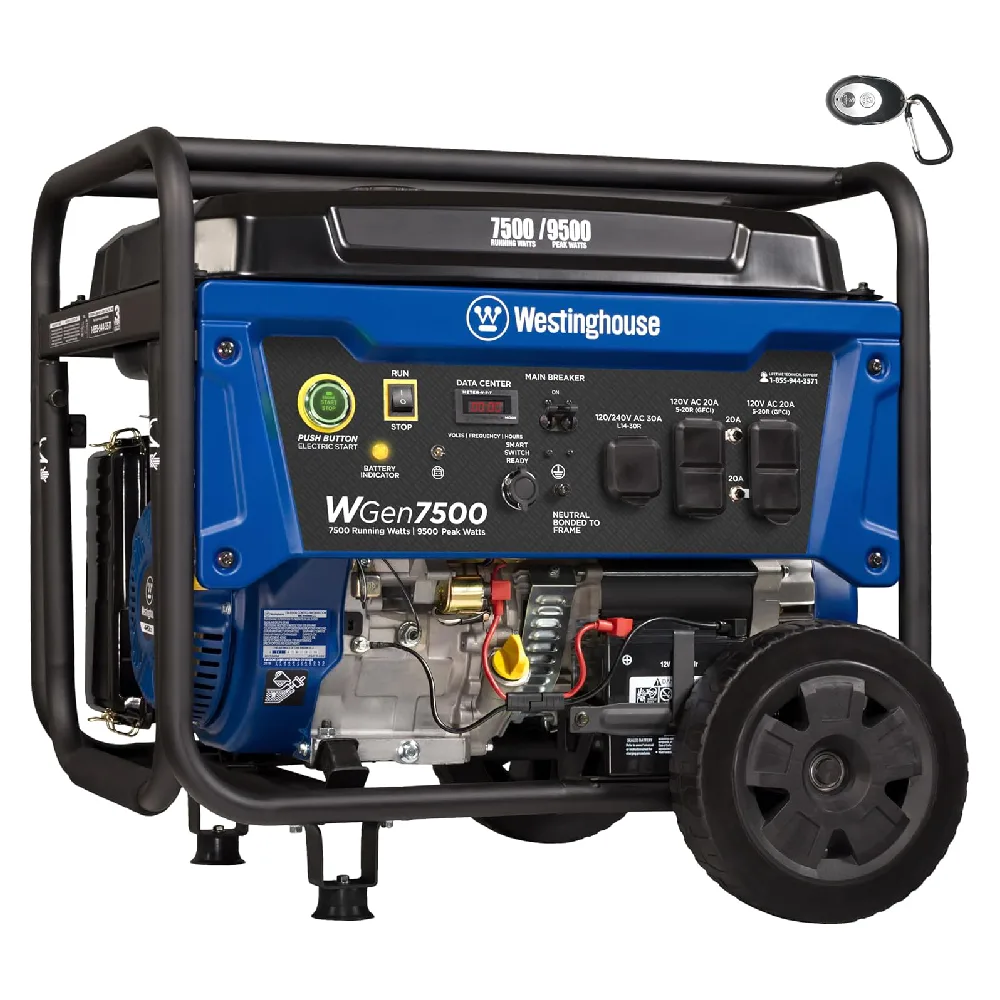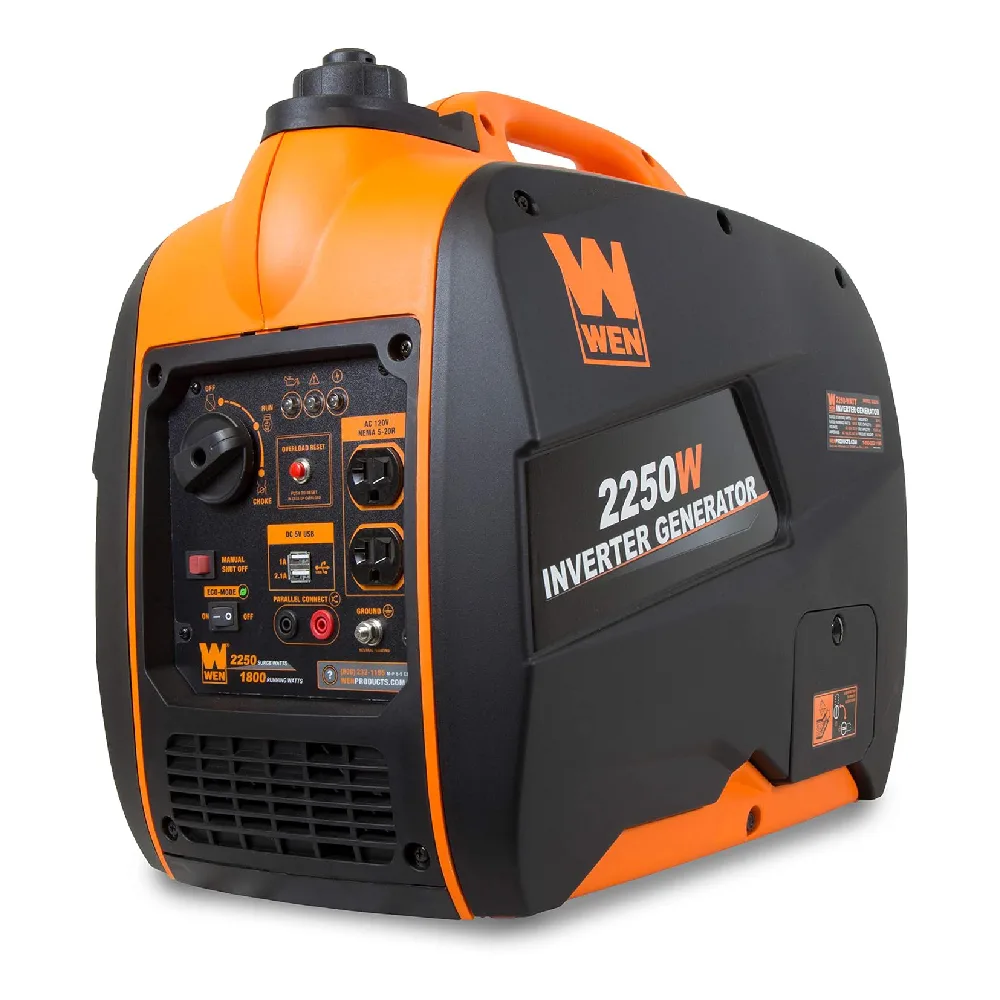We may earn revenue from the products available on this page and participate in affiliate programs. Learn more
Having a portable generator on standby, with fuel ready to go, can ease your mind when the lights go out. With it, you can keep the refrigerator running, along with fans or heaters, and keep your family comfortable until the power comes on again. Without having to worry about your refrigerator’s contents going bad, the loss of electricity could even be a little fun. The time away from computer screens and televisions can lead to family bonding and create great memories during an adverse time.
But the field of portable generators is diverse, and it can be tough to figure out exactly what you’ll need. Read along to get a better understanding of what each can power, and for how long, so you’ll have the right model when disaster strikes. And check out our recommendations for the best portable generators for your needs.
Best Overall: Honda EU2200i
Best for Home: Westinghouse WGen7500
Quietest: WEN 56225i
Best for the Money: Champion Power Equipment 4375-Watt Dual Fuel
Best Overall: Honda EU2200i
Specs
1800 running watts, 2200 peak watts
4.0-9.6 hours runtime on full tank, depending on load
USDA-qualified spark arrestor
Pros
Very quiet, 48-57 decibel range
Lightweight, just 47 pounds
10% more power than previous model
Cons
Only two 120V outlets
This portable generator from Honda is the latest in their Super Quiet Series. At around 50 decibels when in use, this isn’t going to be much louder than a quiet refrigerator or maybe a moderate rainfall. That means you’re not going to be drawing a lot of attention during an extended power outage.
While 1800 running watts sounds low, you’ll still be able to run most of your essential equipment with ease. Manage the load properly and it will run all night long on a single tank of fuel. To be fair, with just two 120V outlets, you’ll not be running a ton of different appliances at once anyway. Another nice feature is that at just 47 pounds you can easily bring the generator right where you need the power, instead of risking tripping over cords running all over the place.
One of the best bonuses with this portable generator is a Bluetooth-connected app, which allows you to manage the fuel consumption and other features from the comfort of your living room while the generator plugs along outside. It also has a carbon monoxide detector built in, so that the generator will automatically shut off if it detects dangerous levels of this deadly gas. It also has a fuel shutoff feature. Once activated, this will burn off the fuel left in the carburetor before shutting the generator down completely. This prevents stale fuel issues as well as potential problems starting after sitting for long periods of time.
Best for Home: Westinghouse WGen7500
Specs
7500 running watts, 9500 peak watts
Electric and recoil start
11 hours runtime on full tank
Pros
Convenient remote start key fob
Several power outlets, all with rubber covers
Transfer switch ready, should that be desired
Cons
A bit loud compared to other models
When the power blips off, you want a portable generator that you can fire up right away. With the remote start key fob for the Westinghouse WGen 7500, you can start it up from the couch. It has a transfer switch, which allows you to feed the power directly into your home rather than running extension cords to where the power is needed. This can be important during long-term power outages.
Another nice feature is the 11-hour runtime on a full tank of gas. That means you can let it run all night long, keeping your refrigerator, freezer, and other appliances powered while you sleep, rather than having to monitor the fuel gauge and wonder if you have enough to make it through. With both electric and recoil start options, you won’t have any trouble getting this portable generator running, even in bad weather.
It is a touch louder than some other models at this level, but that’s a small price to pay for the convenience and power you’re getting. With 7500 watts, you’ll be able to operate quite a few appliances or devices without any trouble at all. At almost 200 pounds, this isn’t something you’ll want to lug around everywhere, but the attached wheels allow you to roll it with ease right where you want it.
Quietest: WEN 56225i
Specs
1600 running watts, 2000 peak watts
51 dBA noise level
9.4 hours quarter-load runtime
Pros
Four outlets total (2 120V, 1 USB, 1 12V)
One-gallon fuel tank size
Weighs under 50 pounds
Cons
Only 1600 running watts
If you don’t need to run a lot of appliances at once, or if you’re looking for something quiet for when you’re camping, this might be right up your alley. The WEN 56200i has an economy mode that allows the generator to maximize fuel efficiency by adjusting fuel consumption as devices are plugged in or unplugged.
At a quarter load, the generator hums along at about 51 decibels, which is quieter than an average conversation. This is one of the reasons why it is recommended for use when camping or otherwise enjoying the outdoors. Another reason is that it weighs less than 50 pounds. You’ll still not want to carry it along on a hike, of course, but maneuvering it from the vehicle to the campsite won’t require a team of bodybuilders.
At about half load, the generator will run six hours on a tank of fuel. This should be plenty of power to charge phones and other devices as well as operate a string of LED lights around the tent area. And it’ll have enough juice leftover to fire up the coffeemaker in the morning.
Best for the Money: Champion Power Equipment 4375-Watt Dual Fuel
Specs
3500 running watts
Dual fuel, runs on gasoline or LP
10-hour runtime on gas, 12 hours on LP
Pros
Budget-friendly sub-$500 price
Runs on the same fuel as your gas grill
Has four 120V outlets for convenience
Cons
Relatively small, 4.7-gallon gas tank
This Champion Power Equipment generator is the most inexpensive portable generator on our list, but it still has plenty of power to get you through a crisis. Keep a few gallons of gas on hand for it and you’ll be able to run the generator all night long. If you run out of gas, use the LP tank from your gas grill to keep the power going. However, it is important to note that the wattage is slightly reduced when using LP, registering 3500 running watts.
It runs at about 68 decibels, which isn’t exactly quiet but you’re not going to be waking up the neighbors with it, either. And with four 120V outlets on the front, you can plug in several devices or appliances at once, rather than having to swap things around on a regular basis.
It weighs a bit less than 110 pounds, so while it is portable, it isn’t exactly a lightweight. However, this is a great portable generator for those who need a model that they can keep in a set location for a period of time, such those who work the outdoor fair and festival circuit.
How I Picked The Best Portable Generators
I have been involved with emergency preparedness, or “prepping,” for about four decades now. I consider emergency power to be a second level need in most cases, coming in behind food, water, and shelter. That doesn’t negate the desire for a generator, of course. It just that being able to stay fed, hydrated, and protected from the elements comes before powering lights and appliances.
That said, there are many instances where having the ability to keep a few things running could be crucial. For example, insulin-dependent diabetics need to have a way to keep that insulin cool so that it doesn’t go bad. Even just keeping food from spoiling is a concern. Various estimates indicate that if the refrigerator’s interior temperature exceeds 40°F for more than four hours, things like meat and dairy should be tossed. Given the prices of food today, that’s an expensive loss.
The portable generators in our list were rated based upon their value for the price as well as the level of power they provide to the user. On top of that, we stuck with models that were easy to use and that did not require experience as an electrician in order to operate properly. The last thing you want in a crisis is to be fumbling around, trying to figure out how to start your portable generator.
What To Consider When Choosing a Portable Generator
There are a few things to keep in mind as you begin to shop around for the best portable generators to meet your needs.
Power
The generator you select needs to provide enough wattage to power the appliances you want running during an outage. There are two ratings to consider: peak and running. Peak, sometimes called starting watts, refers to the power needed to initially turn on the appliance. The running wattage is the power used to keep the appliance going after it’s been started.
To calculate your needs, make a list of all the appliances or devices you want to be able to run, such as your refrigerator, furnace, and television. Find the wattage for each, which is usually on a sticker attached to the appliance. Write that number down, add them together when the list is complete, then multiply that by 1.5 for the wattage total needed for your situation.
Fuel
Most portable generators run on either liquid propane (LP) or gasoline. There are also some models, called dual fuel, that will use either type. Gasoline generators are fine if you have a reliable source for gas, either being able to store quantities of it or you have a gas station in your vicinity that you might be able to patronize as needed. LP tanks, though, are perhaps a little easier to store and there’s less chance you’ll suddenly find one empty because someone used it to fill a lawnmower or go kart. One thing to watch for, though, is that many dual-fuel generators have different wattage ratings as you switch the fuel. Usually this difference is minor, but it is something to be aware of as you plan for power outages.
You can also utilize a solar generator if your energy needs are minimal. Take a look at our roundup of the best solar generators for more options. Whichever you choose, be sure to follow these safety guidelines from OSHA.
Price
At the end of the day, this probably influences most decisions more than anything else. The best portable generators aren’t cheap, even for the smallest ones. As a general rule, the more power the generator can provide, the bigger the price tag. If you need to be especially budget-conscious, you might have to make sacrifices in terms of the appliances you’ll be able to run. Prioritize your needs and then find something you can afford that will run at least the minimum number of devices. There’s a difference between needs and wants when it comes to power. Start with the appliances and devices that are critical. Once those are covered, then worry about luxuries.
FAQs
Q: What’s the difference between gas powered and electric generators?
The difference between gas powered and electric generators is fairly simple. Gas powered generators use an engine to turn an alternator, which produces electricity. Basically, a rotator creates a magnetic field around a group of coils, which then creates power. An electric generator is basically a large-capacity battery that stores energy for later use. You’ll plug it in and charge it in some way, using a wall outlet at home, for example. Or it might be part of a solar generator system that utilizes solar panels to produce electricity. Either way, the electric generator doesn’t produce energy like a gas-powered generator.
Q: How many watts should I get for a generator?
The number of watts you should get for a generator will depend entirely upon what you want to run with the generator. For most people, that will be a refrigerator (300-800 watts), a fan (75-80 watts) or space heater (1500 watts), depending on the time of year, a light or two (250-350 watts each), and probably a phone charger (2-6 watts). Go through your home and decide what you want to run with the portable generator, then find a model that will provide that level of energy.
Q: How much do portable generators cost?
The cost of a portable generator is often directly tied to the amount of power it will provide. The higher the wattage, the higher the price. This is one reason why it is important to understand that you probably won’t be able to afford to run every single device in your home, unless you upgrade to what’s called a whole house generator. When you’re shopping for the best portable generator, you’re going to be focusing on running just the bare essentials through a power outage.
Final Thoughts
Waiting until bad weather is imminent is the wrong time to shop around for a portable generator. Do that and you’ll probably come up empty. Buy one now, while you can find them easily, and fire it up on a regular basis. Get familiar with what it will and will not do, so there are no surprises when the lights go out.
Why Trust Us
For more than 125 years, Field & Stream has been providing readers with honest and authentic coverage of outdoor gear. Our writers and editors eat, sleep, and breathe the outdoors, and that passion comes through in our product reviews. You can count on F&S to keep you up to date on the best new gear. And when we write about a product—whether it’s a bass lure or a backpack—we cover the good and the bad, so you know exactly what to expect before you decide to make a purchase.






